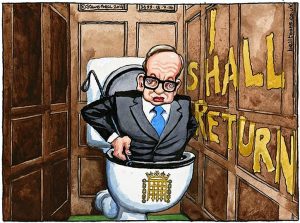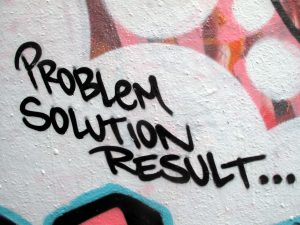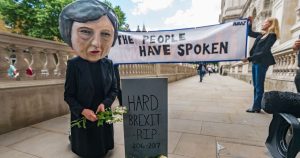Austerity
The global financial crisis of 2007-2008 was addressed in different ways in different countries. In 2010 the UK the Conservative/Liberal Democrat coalition government introduced an austerity programme consisting of sustained reductions in public spending, intended to reduce the government budget deficit and the welfare state. Seven years on government debt has increased from £1 trillion to a massive £1.7 trillion and the deficit is still £15 billion. So there has been some success in reducing the deficit but what was the cost and who bore the brunt?
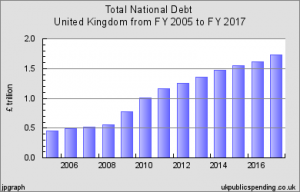
Austerity measures have been implemented in the UK against a background of globalization, a process that should lead to lower consumer prices, greater choice of goods, bigger export markets, economies of scale and greater competition. If that’s true, where have all the benefits gone and what of the downsides:
- exacerbation of income inequalities
- degradation of traditional cultures,
- operating in the interests of the richest,
- not benefiting local communities, and so on?
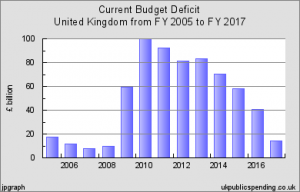
Wealth Inequality
By 2020 the income of the richest 10 per cent of the population are forecast to rise to more than six times the incomes of the poorest 10 per cent. This will be the highest ratio on record. Wealth inequality is increasing so it is clear that the poor are not getting a fair share of the benefits of globalization while definitely feeling the impacts of austerity.
Similarly it is clear that the entire bottom half of the income distribution in the UK will see living standards worsen over the course of the current parliament (to 2020-21) while the richest will see real incomes grow by more that 4%.
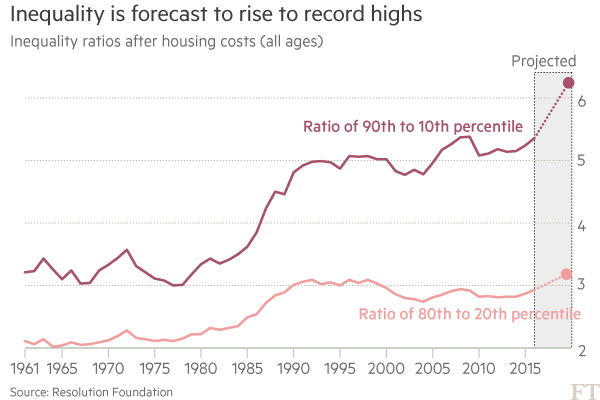
Effects of Austerity
The UK is the fifth largest economy in the world so surely these reductions in living standards for the poorest are compensated by the overall economic wealth in the country? Judging by the evidence, clearly not!
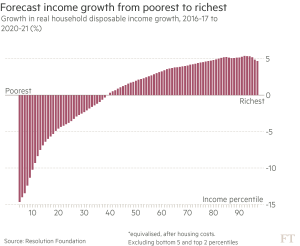
In 2016 there were over a million user visits to foodbanks, a 9% increase over 2015, while millions of people are struggling to afford a decent roof over their heads and two thirds of children in poverty are in working households. There has been a 37% real-terms reduction in government funding to local authorities between 2010 and 2016 and this matters to real people. Local authority funding to help vulnerable people avoid homelessness was cut by 45% between 2009 and 2015. Families of children with disabilities widely can’t access specialist local council help, leaving them without personal assistants, overnight support services and respite care. And 1.2 million people aged 65 and over who need support to eat, dress, or wash are not getting that help.
- These impacts are not uniformly shared as councils in the poorest areas had to cut back local services 10 time as much as in more affluent areas.
- The Royal Society of Medicine has stated that the United Kingdom’s austerity measures in healthcare may have resulted in 30,000 deaths in England and Wales in 2015.
- When the coalition government came to power in 2010, capital investment in new affordable homes was cut by 60%, while government-imposed caps on local authority borrowing continued to restrict their ability to raise money to build new homes.
- Former housing minister John Healey noted that the rate of starting social rented schemes had declined from 40,000 in 2009/10 to less than 1,000 in 2015/16.
- The number of people sleeping rough on any one night across England had more than doubled between 2010 and 2016 to an estimated 4,134, according to a government street count.
https://en.wikipedia.org/wiki/United_Kingdom_government_austerity_programme
Regulatory Austerity
Another theme of government policy in recent years has been a constant attack on ‘unnecessary regulations’, particularly health & safety, demonised and portrayed as barriers to growth and hindering progress. The Tory manifesto for the 2017 snap election stated “… poor and excessive government regulation limits growth for no good reason. So we will continue to regulate more efficiently, saving £9 billion through the Red Tape Challenge and the One-In-Two-Out Rule.”
In reality, sensible regulation facilitates trade and promotes growth while keeping people safe and healthy, and providing decent working and living conditions.
A Dangerous Divide
Evidence shows that the real benefits of globalization have not been shared equally across income groups in the UK. Policy decisions at the national level have directly rewarded the already wealthy at the expense of the poor. The controversial economic theory of austerity, as applied by the coalition and conservative governments, has reduced the deficit but has had absolutely no effect on reducing the national debt. And, combined with attacks on necessary regulation, austerity measures and globalization have made the poor poorer and much less safe. We now see a really dangerous divide in UK society with large portions of the population getting poorer in real terms while working ever harder, seeing their access to safe housing reduced, public services disappearing or becoming harder to access, while a tiny minority get richer and richer – and it is this wealthy minority that are dictating policy. Recent events have made this divide starkly clear and there is a vacuum of leadership when it is sorely needed to steer us away from confrontation and anger towards a more equitable future. This is ticking bomb!





